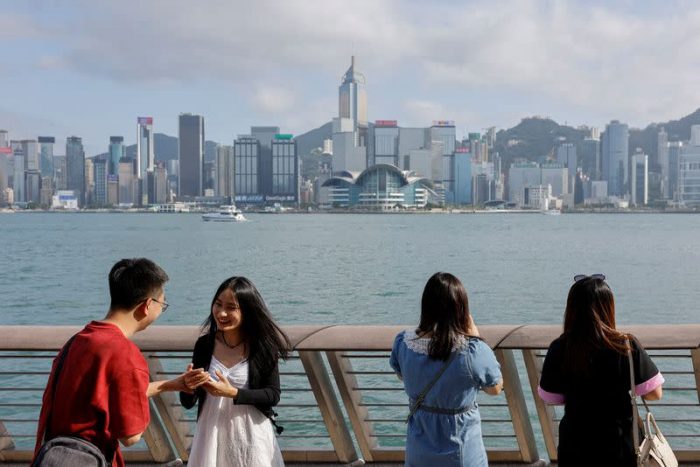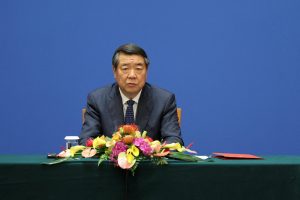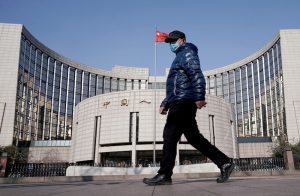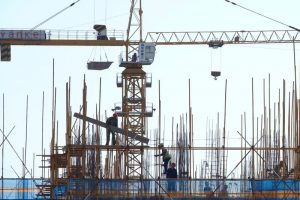Offshore creditors of debt-laden developer China South City plan to file a landmark lawsuit against the group’s biggest state shareholder.
Multiple sources said the creditors would sue Shenzhen SEZ Construction and Development Group, which owns 29% of the company, for dues.
The case will be closely watched as it would be the first such suit in the country’s crisis-hit property sector.
ALSO SEE: US, EU Can’t Meet Climate Goals Without China’s Cheap Green Tech
Earlier this month China South City missed a principal payment of $11.25 million on a dollar bond that matured on February 9, and it is now deemed by creditors to be in default on offshore debts worth $1.3 billion, two of the bondholder sources said.
The group of creditors, who have formed a so-called ad-hoc group, are preparing to file the lawsuit in a Hong Kong court against state-owned Shenzhen SEZ Construction and Development Group Co, four sources said.
Lawsuit to focus on bonds’ keepwell provision
The lawsuit will be filed using a keepwell provision, which the state-owned shareholder had provided to China South City’s dollar bonds, said the sources, who have knowledge of the matter.
If filed, it would be the first lawsuit against a state-backed developer in the property sector for recovery of payments owed to creditors under the keepwell provision since the industry tipped into a crisis in 2021.
A keepwell provision, while not an outright guarantee, is a credit enhancement mechanism that has been used by Chinese companies in recent years for issuance of offshore bonds, according to lawyers.
Under a typical keepwell deed, a parent company undertakes to ensure that its offshore issuer unit will remain solvent and that it will have sufficient liquidity in order to meet payment obligations, said a Latham & Watkins note issued last July.
The lawsuit will add to a handful of cases filed in the Hong Kong court against Chinese developers by offshore creditors, almost all of them seeking their liquidation after they failed to meet repayment obligations.
The property sector, a key pillar of the world’s second-largest economy, has lurched from one crisis to another since 2021 after a regulatory crackdown on a debt-fuelled construction boom triggered an unprecedented liquidity squeeze.
It is not immediately clear how many of the defaulted Chinese developers have the keepwell clause in their bond offerings. The four sources said China South City’s keepwell provision was a rare case in the property sector.
All the sources declined to be named due to sensitivity of the matter. Shenzhen SEZ, China South City and Kirkland & Ellis, the law firm representing the ad-hoc group of developers, did not respond to requests for comment.
Other creditors may lobby for liquidation
Shenzhen-based China South City, a developer of integrated logistics and trade centres, was one of the first property firms that received government support when it faced financial stress in 2022.
At that time, Shenzhen SEZ, which is controlled by the state asset regulator, bought a 29% stake in the developer, and provided keepwell clauses to its five tranches of dollar bonds.
“People like myself got in because of the keepwell clause,” said a bondholder, who also asked to remain anonymous, adding the introduction of that provision and a state-owned company gave confidence.
China South City managed to extend maturities of those five dollar bonds, originally due in 2022 and 2023, to 2024, with consent of bondholders. However, the developer’s financial situation has not improved since then.
In December, China South City proposed to delay payments again, but failed to win enough support. In a statement on February 9, the developer said it would not be able to make redemption and interest payment this month.
One of the sources said offshore creditors of China South City were also considering a lawsuit in Hong Kong seeking its liquidation.
“Creditors are happy to have conversations with China South City for a consensual restructuring but would appreciate the SOE keepwell provider contribute to the process as well,” said Lance Jiang, partner at law firm Ashurst, which is representing some of the developer’s bondholders.
- Reuters with additional editing by Jim Pollard
ALSO SEE:
China Banks Approve $17bn For Housing as Policy Debate Rages
China Chops Mortgage Benchmark Rate to Boost Property Market
Beijing Throws Lifelines to ‘Whitelisted’ Property Developments
China Moves to Lift Property Sector Amid Evergrande Crash Fears
Second Shadow Bank Rocked by China’s Property Crisis
China to Probe Troubled Shadow Bank Steeped In $64 Billion Debt
China’s Property Sector Will Remain Weak For Years: Goldman
























